
Burton on the Bay:
Bill Burton's Yankee Roots
Finding Peace of Mind in Vermont
Any well established village in New England or the northern Middle West could afford a town drunk, a town atheist and a few Democrats.
-From Denis William Brogan's "The American Character"
That written, allow me to introduce you to my Vermont,
a state not of cities or suburbs, just villages - and some towns, which
are nothing more than outgrown villages. The typical village is the fiber
of our nation, and my village is Arlington, which has its town drunk, atheist
and a growing number of Democrats, in the southwestern corner of New England's
only landlocked state.x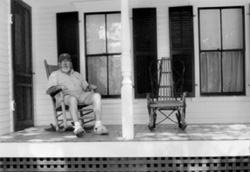
For five years, I have primarily written of Maryland, especially Tidewater Maryland, for this publication, and in the meantime rarely have I hesitated to include personal comments and opinions - some critical, others complimentary.
I've been told I stir the pot, which some readers like, others don't,
but via tradition, such is the job - no, really, the obligation - of columnists,
whose goal is to provoke thought, not just to brighten a day with niceties.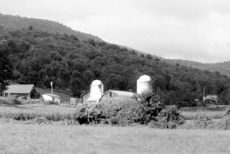
Fully aware, there have been times when words from this on-going column have exasperated, even provoked, many regular readers, I make no apologies. It's the Yankee in me: tell it like it is - or you think it is - while keeping in mind that the people being written about are human beings. Temper comments but don't coat them with sugary frosting.
That's the way it is in rural Vermont, and not much of the Green Mountain State isn't rural.
Allow me to tell you about the village of Arlington and its sister villages of East Arlington and West Arlington, my early stomping grounds and the environment to which can be attributed the thoughts and opinions expressed in this space weekly.
Riding With Aunt MiMi
This is my Vermont: farms and mountains on the outskirts of villages. There are but two real cities, Rutland in central Vermont and Burlington in northern Vermont. People now outnumber cows, but it was the other way around when I moved away to Alaska 45 years ago.
The rural character of many of the villages remains the same, though
diluted by people who come from far and wide to take up a country way of
life. But expansion is limited; the villages are surrounded by mountains
upon which development is strictly limited by environmental and practical
reasons.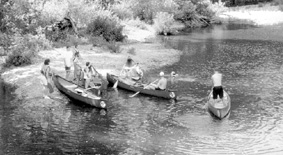
Mountains won't be hacked away in strip mining or for condominiums with scenery. Too much solid rock for development; also, the pride of Vermonters in their mountain scenery. The mountains around Arlington will never be like those being torn asunder at Deep Creek Lake.
For the next several weeks, Arlington, like much of the remainder of Vermont, will be like Ocean City here in Maryland in summertime. Tourists inundate the state to enjoy not the beach but the fall foliage.
I recently returned from a 10-day visit to Arlington to help out Aunt MiMi in preparations for winter. Widowed and in her early 90s, she broke three ribs traversing an electric fence installed around her vegetable patch to keep out rabbits and woodchucks. I went, not as a nurse but to ensure she didn't do too much.
We took a ride late one afternoon up a mountain via an unpaved and slightly used road to Kelley Stand, where in the 1840s, 15,000 people from four states climbed by horse and wagon to hear Daniel Webster campaign on behalf of presidential aspirant William Henry Harrison.
Arlington was the Colonial capital of Vermont; many of its sons fought in the nearby Battle of Bennington, where the Green Mountain Boys defeated British forces trying to carry supplies to the king's men as the stage was set for the Battle of Saratoga, the turning point of the Revolution. It was no supplies, no win for the British.
In the center of Village of Arlington on Route 7-A is St. James Episcopal Church, which I attended, and which in 1829 replaced the original built in 1787. In the cemetery, there is an old marble tombstone that reads:
As you are, so once was I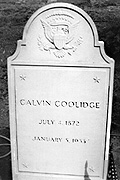
As I am, so you shall be
So prepare yourself to
Follow me.
Politics of Battenkill
Take the road west from the village in the shade of Red Mountain, and
you cross the Battenkill, rated one of the best 10 trout waters in the nation
and the centerpiece of a controversy of increasing intensity. Newcomers
call it the Battenkill River but are quickly reminded by old timers it's
the Battenkill. "Kill" is Dutch for river, Batten refers to a
dam of Colonial times; thus Battenkill River is redundant.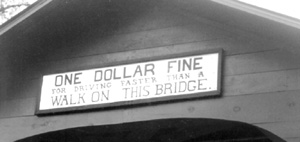
Not only those who fish the Battenkill but many others object to the proliferation of inflatables, canoes and kayaks on the river - though the joy riders mean big business to outfitters and, to some extent, the economy.
Drive farther down Route 313 and, along the way, there are no big and gaudy political signs staked on lawns or anywhere else. Billboards and the likes are barred in Vermont, the first state to do so.
You don't register Democrat, Republican, Independent or even Socialist. (Vermont's sole member of the U.S. House is a Socialist, Bernie Sanders, the only one of that stripe in Congress.) You go to the polling place and request a ballot of your choice at primary time.
Vermonters take their politics seriously; in the recent U.S. Senate primary election, multi-millionaire Jack McMullen's well-greased primary campaign flopped. He had maintained a summer home in another village for 15 years, was a resident of the state only since last year - but something else came into play.
In a debate, his opponent, a 79-year old retired farmer named Fred Tuttle, who pledged to spend no more than $18 for primary and general election purposes combined, asked McMullen how many "milkers" were on a cow's udder. When the latter responded six, the word spread and the outcome at the polls was obvious.
A Rockwell Tableau
River Road runs parallel to Route 313 but is on the other side of the
Battenkill. So west of Arlington you can pass through one of the covered
bridges and look upon the former house and studio of Norman Rockwell, who
painted his greatest works - including the World War II Four Freedoms -
in the 14 years he lived there.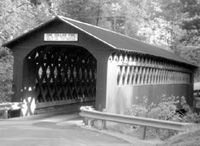
He sold tickets to square dances and socials on the village green across from his house and visited with Robert Frost, who stayed in Arlington while his home was being built in the nearby village of Shaftsbury.
The covered bridge near Rockwell's isn't the only one in Arlington; several cross the Battenkill, and east of the village on Maple Avenue there is the Chiselville Bridge of traditional red and with the sign warning motorists of the speed limit: no faster than a walk.
The covered bridges of Vermont are utilitarian as well as scenic. At town meeting time in March, townspeople vote money to paint and otherwise maintain them. Yankees have an old saying: "If it ain't broke, don't fix it," and those old covered bridges ain't broke, so why replace them with ugly and costly cement and steel?
Alongside the Battenkill on the other side of the village there is a roadside vegetable stand piled high with produce, but no attendant. There is a wicker basket on a table next to a list or prices; pick what you want, and put the money in the basket. When I deposited three bucks for six huge green Hubbard squashes, I noted there was $27.35 in the basket - yet no one anywhere around to check the till.
Anwar al-Sadat said in 1978, "A man's village is his peace of mind." In Vermont, a man's peace of mind is his village.
| Back to Archives |
VolumeVI Number 39
October 1-7, 1998
New Bay Times
| Homepage |